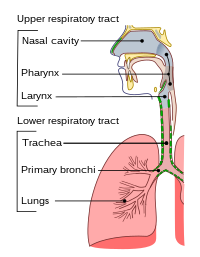
Photo from wikipedia
AIMS The goal of this study was to analyze potential associations between referrals to hospitals and various factors, including patient age and sex, and several diagnoses. MATERIALS AND METHODS This… Click to show full abstract
AIMS The goal of this study was to analyze potential associations between referrals to hospitals and various factors, including patient age and sex, and several diagnoses. MATERIALS AND METHODS This retrospective cross sectional study included 2,050,453 adult patients (mean age (SD): 52.3 (19.8) years; 53.0% women) with at least one visit to 1 of 900 general practices (GPs) in Germany between January 2019 and December 2019 documented in the Disease Analyzer database (IQVIA). The main outcome of the study was the prevalence of patients with at least 1 referral to hospital in 2019. A multivariate logistic regression model was conducted to study the association between age, sex, the predefined diagnoses, and referrals to hospitals. RESULTS Of the patients analyzed, 6.6% were referred to hospitals in 2019. The proportion of patients who were referred to hospitals increased with age, from 3.5% in the 18 - 40 age group to 12.5% in the age group over 80. In the multivariate regression analyses, 23 diseases were significantly associated with referrals to hospitals. The strongest association was observed for acute appendicitis (odds ratio (OR: 15.64 (95% confidence intervals (CI): 14.70 - 16.64)), followed by hernia (OR: 4.36 (95% CI: 4.21 - 4.51)), cholelithiasis (OR: 3.08 (05% CI: 2.95 - 3.22)), breathing abnormalities (OR: 2.58 (95% CI: 2.49 - 2.69)), cancer (OR: 2.32 (95% CI: 2.26 - 2.37)), and abdominal and pelvic pain (OR: 2.28 (95% CI: 2.23 - 2.34)). CONCLUSION The proportion of patients referred to hospitals is high, and hospital care plays an important role in treating several gastrointestinal, oncological, cardiovascular, and respiratory disorders.
Journal Title: International journal of clinical pharmacology and therapeutics
Year Published: 2020
Link to full text (if available)
Share on Social Media: Sign Up to like & get
recommendations!